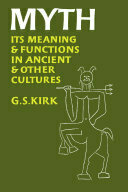
This book, developed out of the 1969 Sather lectures at Berkeley, California, confronts a wide range of problems concerning the nature, meaning and functions of myths. Professor Kirk's aim is to introduce a degree of coherence and of critical awareness into a subject that arouses profound interest today, but which for too long has been the target of excessive theorizing and interdisciplinary confusion between anthropologists, sociologists, classicists, philosophers and psychologists. Professor Kirk begins by discussing the relation of myths to rituals and folktales, and the weakness of universalist theories of function. He then subjects Lévi-Strauss's structuralist theory to an extended exposition and criticism; he considers the character and meaning of ancient Near Eastern myths, their influence on Greece, and the special forms with rational modes of thought, and finally, he assesses the status of myths as expressions of the unconscious, as elements of dreams, universal symbols, as accidents along the way to some narrative objective. The result is a significant critical venture into the history and philosophy of thought, imagination, symbol and society.--From publisher description.